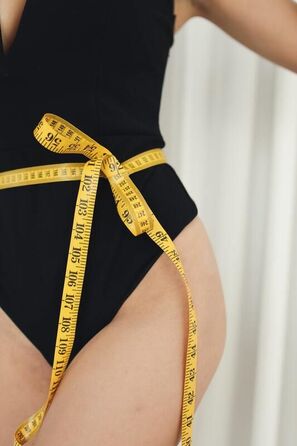|
I was at a family Seder in 1963, talking to an aunt about the women’s exercise classes I was teaching at a local Jewish Community Center. When I mentioned that I’d started with one class of four and was now teaching three full classes with a waiting list, a cousin’s husband who’d overheard asked if he could talk with me. He invited me to go outside and sit on porch chairs where we could talk privately. He told me he worked in publishing and asked a lot of questions about what I was teaching the women, how the increase in numbers of classes happened, and why I thought the women were so responsive. I told him the women generally had bad feelings about their bodies, were not in good shape, and thought the classes were helping them feel better in a lot of ways. “I think we have a lot to talk about,” he said, giving me his card. “Call me next week so we can arrange a time to meet.” He met me at the elevator, greeting me with a hug and smile that unsettled me. I barely knew him yet he acted as if we were close family. His office was impressive—lots of windows, healthy looking plants, comfortable chairs—but the walls were filled with framed covers, mostly young women with glorious figures posing in bathing suits and various states of undress, which made me wonder why he wanted to talk with me. What kind of self-help was he wanting me to write?
His secretary brought us coffee and pastries. I wasn’t hungry. I’d already had too much coffee, but I took the offered cup just to be social. He didn’t waste time on pleasantries. “I know you’re a teacher and teachers don’t earn much. If we work together I can make you a lot of money” He grinned. “A whole lot of money. Here’s the deal. Women want to look good. That means they have to know what to do to look their best. You write a soft cover book with exercises and diet suggestions, as well as tips on how to attract men. I provide the photos and the publicity. We call it “The King Method in big print. In small print we say something about how this book can help you live the life you choose. We put it on shelves near grocery checkouts, in gyms, fitness studios—any place women go. You offer workshops and seminars which we’ll organize, and sell copies of the book.” He grinned. ‘Great idea, right?” I couldn’t help thinking he sounded like a used car salesman. He drank some coffee. He told me I’d get a five-figure advance. I was stunned. He was offering me a huge amount of money to write a book, Money for an idea, not even a written proposal. It was more money than my husband and I earned in a year, multiplied many times over. He mistook my silence for wanting more money and said, “Look, if it’s too little money I might be able to get you a bigger advance.” He grinned even more, which unnerved me. “Just think about it. The King Method will make you famous . . . as well as a lot of money. What could be better?” Fantasies of being a famous author filled my imagination. At least I was clear about the title. “We can’t name the book The King Method. What I teach is based on anatomy, physiology, and kinesiology.” He shrugged. I kept seeing the gorgeous female bodies on the walls. “The women in my classes will never look like the women on your covers no matter how hard they work. They’re not in their twenties and they don’t wear bikinis.” “So what? They can’t dream? You’re selling them a sense of what they could be. And who knows? Maybe they can. You telling me they’re stuck with how they look forever?” He had a point. Was I underestimating the possibility of the women I taught changing how they looked? Could what I write help women feel better about themselves? What he said sounded good and yet something felt off. Maybe it was all the babes in bikinis staring at me. “Suppose I write this book and you don’t like it. Then what?” “No chance of that. You send me what you write chapter by chapter and I make the necessary changes.” “What if I don’t agree with the changes?” “You will,” he said. “We both want the same thing.” “What’s that?” I asked. He ignored the question and began telling me once again what he could do for me and how great it would be to work together. “So, ready to sign a contract?” I wanted to be an author. I liked the idea of earning a lot of money by writing a book, especially a lot more money than my husband earned. When I told him I was thinking about writing a book he’d responded, “What do you know?” I liked the idea of writing a book that might help women change their lives in ways they chose so they could feel better about themselves. I imagined being on talk shows, leading workshops all over the country, having money to hire baby sitters so I could have a life apart from my son and husband. I drank the cup of coffee and he refilled it, smiling as if he knew my answer. I thought about the photos of svelte young women covering the walls of his office, about his rewriting what I wrote with me having no chance to object or rewrite, yet my name would be on the cover. I thought about the book I was thinking about writing, about women who were looking for ways to feel better about themselves and how they looked, who appreciated not only what I taught, but the class’s camaraderie, how they supported each other. We were talking about two entirely different books, only one of which I could possibly write, which wasn’t the book he was describing. My wanting to be famous and rich danced with my conscience. If I made a lot of money writing the book he was proposing, I could then write the book I wanted, but would I have credibility? It seemed the choice was between money and self-respect. Either or, but not both. Reality took hold. If I accepted his proposal I would earn a huge amount of money, but I’d have no way of ensuring I could write what I wanted, no control over what was published. No chance of taking my name back if I didn’t like the book. Conscience won. “I appreciate your thinking of me. It was good to talk with you. The offer is more than generous--” “But . . .?” he said interrupting me. “I can’t do it. What you want me to write, how you want me to write it, it’s not who I am. It’s not how I work. It’s not even how I think. And, there is no King Method.” “There could be,” he said, looking puzzled. “Maybe, if it’s written by someone else with the name of King, but not by me. He shook his head. “You’re making a big mistake. Think again. Besides the money, this is a great opportunity for you to make a name for yourself. You’ll be famous.” “I appreciate your thinking of me but the book you’re proposing isn’t the book I want to write.” I thanked him and left. There was no way I could sign the contract and live with myself. That was my first book contract offer. Seven years later, in the Russian Tea Room, the editor of Drama Book Specialists offered me a low four-figure contract to publish my first book, Theatre Movement. I accepted. How would you react to an experience where your conscience and checkbook collided?
1 Comment
Marlene Simon
4/4/2023 01:29:51 pm
A strong moral compass. Bravo. It's not always to easy to make such a decision but I have a feeling it was for you. When you start compromising your values it's such a slippery slope. I've had some challenges in the past and believe that I made the right decision for me. When we don't it opens up a can of worms and can take us down paths that are painful. In truth, they are all opportunities for growth. But something about how firm you were in your choices was very inspiring. Thank you for sharing this.
Reply
Leave a Reply. |
Monthly StoriesStories inspired by world tales to challenge and comfort. Archives
July 2024
Categories |
Copyright © Nancy King 2020 | Site Design by Angulo Marketing & Design
|
|
Nancy King is a widely published author and a professor emerita at the University of Delaware, where she has taught theater, drama, playwriting, creative writing, and multidisciplinary studies with an emphasis on world literature. She has published seven previous works of nonfiction and five novels. Her new memoir, Breaking the Silence, explores the power of stories in healing from trauma and abuse. Her career has emphasized the use of her own experience in being silenced to encourage students to find their voices and to express their thoughts, feelings, and experiences with authenticity, as a way to add meaning to their lives.
|


 RSS Feed
RSS Feed